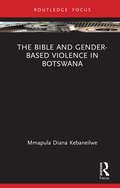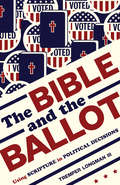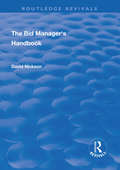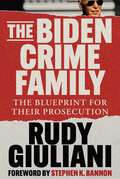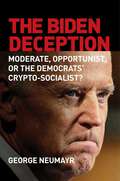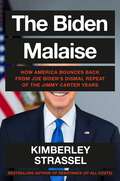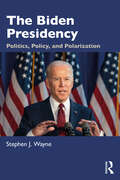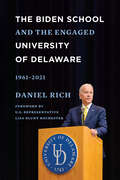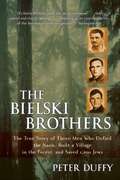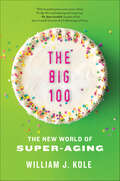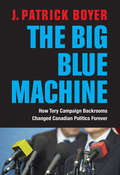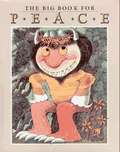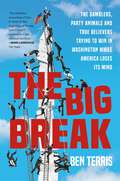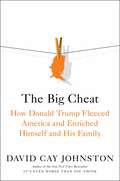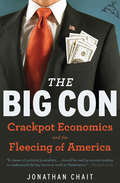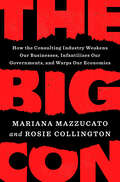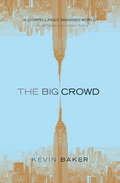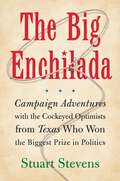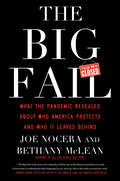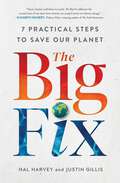- Table View
- List View
The Bible and Gender-based Violence in Botswana (ISSN)
by Mmapula Diana KebaneilweThe Bible and Gender-based Violence in Botswana foregrounds the rampancy of gender-based violence against women and girls in biblical texts and how it resonates with gender-based violence (GBV) in the author’s contemporary context of Botswana.The volume reads selected texts from the Bible alongside newspaper reports of GBV against women and girls in Botswana to show that while the Bible is taken as an authoritative text within the Botswana context, it is riddled with GBV against female persons. It asserts that by acknowledging and naming GBV in biblical texts and not concealing, ignoring, or spiritualizing it, contemporary communities of faith will be able to confront the problem in these contexts. By so doing, the book argues, the Bible will become a resource for positive transformation rather than a tool for supporting gender injustice.The book appeals to everyone willing to see positive change in regard to gender in/equality and is intended for a wide readership including researchers, postgraduates, church and other representatives of religious institutions, and upper-level undergraduates.
The Bible and the Ballot: Using Scripture in Political Decisions
by Tremper Longman IIIHow to read the Bible on matters of public policyChristians affirm the Bible as our standard of faith and practice. We turn to it to hear God&’s voice. But what relevance does the Bible have for the contentious public policy issues we face today? Although the Bible does not always speak explicitly to modern issues, it does give us guiding principles as we think about how we might vote or act as political figures ourselves. The Bible and the Ballot demonstrates the proper use of Scripture in contemporary political discussions. Christians regularly invoke the Bible to support their positions on many controversial political topics—gay marriage, poverty, war, religious liberty, immigration, the environment, taxes, etc.—and this book will help facilitate those conversations. Tremper Longman provides a hermeneutical approach to using the Bible in this manner, then proceeds topic by topic, citing important Scriptures to be taken into consideration in each case and offering an evangelical interpretation. Longman is careful to suggest levels of confidence in interpretation and acknowledges that often there are a range of possible applications. Each chapter includes questions to provoke further thought in individuals&’ minds or for group discussion. The Bible and the Ballot is a ready guide to understanding the Bible on issues that American Christians face today as we live within a pluralistic society.
The Bible and the Ballot: Using Scripture in Political Decisions
by Tremper Longman IIIHow to read the Bible on matters of public policyChristians affirm the Bible as our standard of faith and practice. We turn to it to hear God&’s voice. But what relevance does the Bible have for the contentious public policy issues we face today? Although the Bible does not always speak explicitly to modern issues, it does give us guiding principles as we think about how we might vote or act as political figures ourselves. The Bible and the Ballot demonstrates the proper use of Scripture in contemporary political discussions. Christians regularly invoke the Bible to support their positions on many controversial political topics—gay marriage, poverty, war, religious liberty, immigration, the environment, taxes, etc.—and this book will help facilitate those conversations. Tremper Longman provides a hermeneutical approach to using the Bible in this manner, then proceeds topic by topic, citing important Scriptures to be taken into consideration in each case and offering an evangelical interpretation. Longman is careful to suggest levels of confidence in interpretation and acknowledges that often there are a range of possible applications. Each chapter includes questions to provoke further thought in individuals&’ minds or for group discussion. The Bible and the Ballot is a ready guide to understanding the Bible on issues that American Christians face today as we live within a pluralistic society.
The Bible of Unspeakable Truths
by Greg GutfeldGreg Gutfeld, the acclaimed host of the popular, nightly Fox News show Red Eye, has packed this book full of his most aggressive (and funny) diatribes -- each chapter exploring Unspeakable Truths that cut right to the core and go well beyond just politics. Greg deconstructs pop culture, media, kids, disease, race, food, sex, celebrity, current events, and nearly every other aspect of life, with Truths including but not limited to: "if you're over 25 and still use party as a verb, then you're beyond redemption," "the media wanted bird flu to kill thousands," "attractive people don't write for a living," "death row inmates make the best husbands," and "the urge to punch Zach Braff in the face is completely natural. " With an irreverent voice, incredible wit, and a firm take on just about everything, this is a manual for how to think about stuff, by a guy who has thought about precisely that same stuff. And, even if you disagree with Greg, this book will make you laugh--guaranteed. * *Not guaranteed.
The Bid Manager's Handbook
by David NicksonThis title was first published in 2003. Winning significant business on the right terms is an increasingly complex, challenging and time-consuming task, and a successful bid is a vital part of any business offering its services or products to another. This book aims to help you to enhance the probability of success in winning bids at the desired margins and to set-up and run effectively a bid management team. Aimed at two main groups of readers (sales staff managing multi-disciplinary bid teams and project and technical managers who find themselves managing a bid to support a sales campaign) it's a resource for the battle to win new business. Taking an extremely practical approach and using real life examples David Nickson leads the reader through every stage of planning for, producing and delivering a bid: knowing what needs to be done; knowing how to present the information to the prospective client effectively; gaining the writing and editorial skills needed to put a sales case across; identifying the skills that are needed to manage a bid. It also shows how to save time - the most important commodity in any bid as it is always a scarce resource - without affecting quality.
The Biden Crime Family: The Blueprint for Their Prosecution
by Rudy GiulianiThe Biden Crime Family is a short, engaging description of the evidence that supports the case that President Joe Biden and his family are deeply corrupt. They are so corrupt that when former New York mayor and US attorney Rudy Giuliani first stumbled across evidence of what they were doing in Ukraine, it reminded him of his experience prosecuting the five mafia families that used to run New York. Joe Biden began to seek enormous bribes and payouts when he became vice president. In every situation where he was the point man for the Obama administration&’s policy toward a country, he ended up making millions of dollars, and failing to obtain whatever the US policy goal was. In these endeavors, Joe&’s drug addicted younger son, Hunter, worked with him. Hunter was the &“bagman.&” You can question whether it was loving or even decent for a politician to use his dysfunctional son in this matter. But it happened. Joe&’s brother James also served as a bagman, sometimes working with Hunter. Other family members participated as needed. When Joe was made the point man for Ukraine—with the special mission of cleaning up Ukrainian corruption so deep that it had left the country almost bankrupt—he did nothing to help. Instead, he had Hunter placed on the board of Burisma, an energy and gas company at the center of some of Ukraine&’s most corrupt government dealings. Hunter took home a million a year to do nothing. The rule was &“ten percent for the big guy.&” Hunter has complained about how half his income went to dad. The same and worse happened with Joe in China and Iraq. The Biden Crime Family displays the evidence clearly—and makes the kind of case that should get a conviction on Biden family corruption.
The Biden Deception: Moderate, Opportunist, or the Democrats' Crypto-Socialist?
by George Neumayr&“I have the most progressive record of anybody running.&” If you want to know how far-left a Joe Biden presidency would be, you need look no further than his own words. His rhetoric may not be as fiery as that of Bernie Sanders, but make no mistake: he holds essentially the same policy positions. Bestselling author and former Hoover Institute fellow George Neumayr lays out the truth the media won&’t tell you: that Blue-collar Joe disappeared decades ago. He is far more comfortable on the Ellen show than on the streets of Scranton. He has given up Amtrak for private jets, and, like his lobbyist brother and grifter son, has cashed in on his last name. While the media and Democrat establishment—eager to dupe independents and Never-Trump Republicans—spin talking points to paint Biden as the moderate and lovable &“Uncle Joe&”, the reality is a Biden presidency threatens to return America to the disastrous and radical left-wing politics and policies of the Obama era.
The Biden Malaise: How America Bounces Back from Joe Biden's Dismal Repeat of the Jimmy Carter Years
by Kimberley Strassel&“In the style of a dogged prosecutor, Strassel builds a devastating case against Joe Biden&’s record…THE BIDEN MALAISE is must-read ahead of 2024, as conservative voters prepare to make consequential choices.&”―Guy Benson, Fox News & Townhall.comThe bestselling author of Resistance (At All Costs) and The Intimidation Game argues that Joe Biden, like Jimmy Carter before him, has mired the country in weakness, inflation and political unease. Whether in politics or policy, the parallels between the Biden and Carter presidencies are now beyond striking. Two presidents—separated by nearly 50 years—beset by the same domestic and foreign policy morasses, politically swamped by a national ennui. However, THE BIDEN MALAISE will examine why such claims overlook important nuances that show President Biden&’s blunders are ultimately far worse. Our current president inherited a better situation along with the lessons of what not to do from Carter's governance. Biden, captive to an ascendent progressive wing of his party, doubled down on Carter&’s mistakes and created crises that were as avoidable as they are now severe. From soaring energy prices and inflation to humiliating foreign policy errors, the Biden administration's political mess is self-imposed. His political handling of these fiascoes—like Carter—has only made his situation worse. Democrats risk a public backlash of the sort that opened the way to the Reagan Revolution. Award-winning and bestselling journalist Kim Strassel offers a formula for the GOP to capitalize from this mayhem; one that rekindles the bold and reformist approach of the 80s and 90s, an aspirational agenda that puts Americans back in control of their destiny on issues ranging from healthcare, to energy, to entitlements. THE BIDEN MALAISE is a penetrating look at our current political climate and a book that explains how the GOP can use this opportunity to elect a leader who can restore faith in American exceptionalism.
The Biden Presidency: Politics, Policy, and Polarization
by Stephen J. WayneThis book is among the first serious looks at the first 18 months of the Biden administration and its many challenges. From a tortured transition to a raging pandemic, a fragile economy, and the threat of international insecurity, Joe Biden entered office at a time even more fraught than that he faced as a new vice president. Confronting a nation divided sharply along political, cultural, and sociodemographic lines, Biden and Kamala Harris promised to unify the country, change the tone in Washington, mend fences with allies, and “build back better” a world assailed from stem to stern. This book assesses the successes and shortfalls of the Biden administration’s first 18 months in office, putting all in perspective of the current state of democracy in America. Intended to introduce students of American government to the person (Biden) and the institution (presidency) within a particular system (separation of powers), this book will appeal broadly to citizens, media, and general interest readers in the United States and abroad.
The Biden Presidency: Politics, Policy, and Polarization
by Stephen J. WayneThis book is among the first serious looks at the first 18 months of the Biden administration and its many challenges. From a tortured transition to a raging pandemic, a fragile economy, and the threat of international insecurity, Joe Biden entered office at a time even more fraught than that he faced as a new vice president. Confronting a nation divided sharply along political, cultural, and sociodemographic lines, Biden and Kamala Harris promised to unify the country, change the tone in Washington, mend fences with allies, and “build back better” a world assailed from stem to stern. This book assesses the successes and shortfalls of the Biden administration’s first 18 months in office, putting all in perspective of the current state of democracy in America. Intended to introduce students of American government to the person (Biden) and the institution (presidency) within a particular system (separation of powers), this book will appeal broadly to citizens, media, and general interest readers in the United States and abroad.
The Biden School and the Engaged University of Delaware, 1961-2021
by Daniel RichThis book reviews the history of the Joseph R. Biden, Jr. School of Public Policy and Administration from 1961 to 2021. The focus is on the school’s accomplishments over its first sixty years, how they were achieved, and why they are significant. The analysis describes the challenges and opportunities that shaped the school’s development and its emergence as one of the nation’s leading public affairs schools. What began in 1961 as an experimental program supported by a single external grant emerged six decades later as one of the nation’s leading comprehensive schools of public affairs. That transformation unfolded during one of the most dynamic periods in the history of higher education when the public purpose of universities was expanded. The history of the Biden School is a story of institutional innovation, perseverance, adaptation, and resilience.
The Bidens: Inside the First Family’s Fifty Years of Tragedy, Scandal, and Triumph
by Ben SchreckingerA deeply reported exploration of Joe Biden as told through his extended family.
The Bielski Brothers: The True Story of Three Men Who Defied the Nazis, Built a Village in the Forest, and Saved 1,200 Jews
by Peter Duffy<p>In 1941, three brothers witnessed their parents and two other siblings being led away to their eventual murders. It was a grim scene that would, of course, be repeated endlessly throughout the war. Instead of running or giving in to despair, these brothers - Tuvia, Zus, and Asael Bielski - fought back, waging a guerrilla war of wits against the Nazis. <p>By using their intimate knowledge of the dense forests surrounding the Belarusan towns of Novogrudek and Lida, the Bielskis evaded the Nazis and established a hidden base camp, then set about convincing other Jews to join their ranks. As more and more Jews arrived each day, a robust community began to emerge, a "Jerusalem in the woods." <p>After two and a half years in the woods, in July 1944, the Bielskis learned that the Germans, overrun by the Red Army, were retreating back toward Berlin. More than one thousand Bielski Jews emerged - alive - on that final, triumphant exit from the woods.</p>
The Big 100: The New World of Super-Aging
by William J. KoleJournalist William J. Kole, reluctant but newly minted member of AARP, explores the looming era of super-aging—incredibly longer lifespans overall, and eight times more centenarians by the year 2050—through the lens of past, present, and future life at ages 50, 65, 80, and on to 100-plus. What happens to all of us when 65 is merely a life half-lived?By 2050, the world’s centenarian population—those aged 100 or more—will increase eightfold. Half of today’s 5-year-olds can expect to reach the same heights. It’s going to upend everything we thought we knew about health care, personal finance, retirement, politics, and more. Whether we’re 18 or 81, this tectonic demographic shift will affect us all. The Big 100 confronts readers with both the brightness and potential bleakness of a fate few of us thought possible. Journalist William Kole guides us on this journey into our future, an optimistic but sometimes fraught exploration of super-aging as the grandson of a centenarian. Along the way, there are expert sources, like Dr. Jane Goodall, longevity expert Dr. Thomas Perls, Senator Elizabeth Warren, and even 101-year-old influencer and fashionista Iris Apfel; along with surprises, including the truth about those so-called “Blue Zones” everyone thinks are centenarian factories. (Spoiler alert: They’re not.) And there’s the troubling truth that those reaching extreme longevity tend to be overwhelmingly white, a product of what experts deem the “weathering theory”: the idea that the health of African Americans begins to deteriorate in early adulthood as a physical consequence of socio-economic disadvantages. How long can we live? How long should we live? And what happens when 65 is merely a life half-lived? The Big 100 explores the most pressing questions of our super-aging future, and offers a glimpse of a reality that awaits us, our children, and our grandchildren.
The Big Blue Machine: How Tory Campaign Backrooms Changed Canadian Politics Forever
by J. Patrick BoyerAn inside account of the Progressive Conservative’s campaign organization. The Progressive Conservative Party’s “big blue machine” pioneered electoral techniques of centralized control, communications, campaign advertising, polling, policy-presentation, and fund-raising. Inspired by Dalton Camp and Norman Atkins, its widespread yet close-knit network of organizers and specialists changed how Canadian campaigns were fought, even as their “political machine” transformed Canadian public life itself. J. Patrick Boyer’s behind-the-scenes account reveals how and why the blue machine’s campaign innovations (most imported from the U.S.) transformed Canadian politics forever. Boyer’s direct experience in these changes, and interviews with key players from Tory backrooms, enrich his authentic and timely account. This saga of the formidable campaign organization operating inside the Progressive Conservative Party for more than four decades shows why the big blue machine deservedly became a Canadian political legend.
The Big Book for Peace
by Lloyd Alexander Marilyn Sachs Lois Lowry Yoshiko Uchida Katherine Paterson Jean Fritz Natalie Babbitt Nancy Willard Myra Cohn Livingston Charlotte Zolotow John Bierhorst Thacher Hurd Steven Kellogg Milton Meltzer Mildred Pitts Walter Jean Craighead GeorgeThe wisdom of peace and the absurdity of fighting are demonstrated in seventeen stories and poems by outstanding authors of today such as Jean Fritz, Milton Meltzer, and Nancy Willard.
The Big Book of Presidents: From George Washington to Barack Obama
by Nancy J. HajeskiThe president has been the figurehead of the United States since the time when our country was a small band of thirteen fledgling colonies until its current position as a world superpower. The forty-four leaders of our nation have had fascinating, exciting, and sometimes scandalous lives. The Big Book of Presidents illustrates each president's journey to the White House through facts, anecdotes, illustrations, photographs, inspirational quotes, and more! Find out which president had a faithful dog named Fala, who was the only unmarried president, and which president's daughter carried around her pet snake in the White House in this fun and fascinating overview of our country's leaders.Bestselling author Nancy J. Hajeski not only provides engaging information about each president, but also includes timelines of US and world events that place each president's term in office in a historical context. She also provides useful facts about the White House, Congress, the Supreme Court, presidential assassinations, the first ladies, the vice presidents, and more to help broaden kids' understanding of our government and the president's role within in. With updated information on President Barack Obama, this is the perfect introduction to the lives and characters of the US presidents.
The Big Break: The Gamblers, Party Animals, and True Believers Trying to Win in Washington While America Loses Its Mind
by Ben Terris"No one gets today's Washington like Ben Terris…THE BIG BREAK is the definitive accounting of &‘how it works&’ in this ongoing post-Trump (pre-Trump?) maelstrom. I just imbibed this book." ―Mark Leibovich, author of This TownIn this fascinating investigation into the real life inner workings of a post-Trump American government, uncover the odd and eccentric personalities grappling for their own bit of power in D.C.The Big Break investigates how Washington works, and how different kinds of people try to make it work for them. Ben Terris presents an inside history of this crucial moment in Washington, reporting from exclusive parties, poker nights, fundraisers, secluded farms outside town and the halls of Congress; among the oddballs and opportunists and true believers. This book is about the people who see this moment as an opportunity to bet big—on their country or maybe just on themselves. It will take a close look at Washington&’s bold-faced names as they try to get their bearings on the post-Trump (and possibly pre-Trump) landscape. And it will introduce readers to the behind-the-scenes players — MAGA pilgrims and Resistance flamekeepers and shapeshifting veterans — who believe they know what Washington, and America, must do if they&’re going to survive, or even thrive. Trump&’s arrival in Washington represented a big break in how the city operated. He surrounded himself with outsiders; power structures reorganized around those who knew him or his family and those who could flatter and influence his base. He changed the way the game was played, only it wasn&’t actually a game at all. When pro-Trump elements both inside and outside of government plotted to overturn his loss in the 2020 presidential election, the Capitol became a combat zone, then a military fortress. It was, to put it lightly, a destabilizing time. But how much did the Trump years really change Washington? Has Joe Biden&’s presidency heralded a return to normal, as many had hoped? What did &‘normal&’ mean before Trump, and what do people think it means now? The Big Break will follow a cast of D.C. characters in search of answers to these questions. They are a diverse crew—a pollster with a gambling habit, an oil heiress with a big heart, a cowboy lobbyist, a Republican kingmaker who decided to love Trump and his right-hand man who decided he couldn&’t any longer. They all share at least one thing in common: They had seen their country go through a Big Break, and they&’d come to get theirs.
The Big Cheat: How Donald Trump Fleeced America and Enriched Himself and His Family
by David Cay JohnstonPulitzer Prize–winning reporter and dean of Trumpologists David Cay Johnston reveals years of eye-popping financial misdeeds by Donald Trump and his family.While the world watched Donald Trump&’s presidency in horror or delight, few noticed that his lifelong grifting quietly continued. Less than forty minutes after taking the oath of office, Trump began turning the White House into a money machine for himself, his family, and his courtiers. More than $1.7 billion flowed into Donald Trump&’s bank accounts during his four years as president. Foreign governments rented out whole floors of his hotel five blocks from the White House while lobbyists conducted business in the hotel&’s restaurants. Payday lenders and other trade groups moved their annual conventions to Trump golf resorts. And individual favor seekers joined his private Mar-a-Lago club with its $200,000 admission fee in hopes of getting a few minutes with the President. Despite earning more than $1 million every day he was in office, Trump left the White House as he arrived—hard up for cash. More than $400 million in debt comes due by 2024, and Trump still lacks the resources to pay it back. The Big Cheat takes you on a guided tour of how money flowed in and out of Trump&’s hundreds of enterprises, showing in simple terms how his family and courtiers used his presidency to enrich themselves, even putting national security at risk. Johnston details the four most recent years of the corruption that has defined the Trump family since 1885 and reveals the costs of Trump&’s extravagant lifestyle for American taxpayers.
The Big Con: Crackpot Economics and the Fleecing of America
by Jonathan ChaitThe scam of supply-side economics is clearly and convincingly explained in &“a classic of political journalism&” (Michael Lewis). Jonathan Chait has written for a range of publications, from the Wall Street Journal to the Washington Post, and considers himself a moderate. But he&’s convinced that American politics has been hijacked. Over the past three decades, a fringe group of economic hucksters has corrupted and perverted our nation&’s policies, Chait argues, revealing in The Big Con how these canny zealots first took over the Republican Party, and then gamed the political system and the media so that once-unthinkable policies—without a shred of academic, expert, or even popular support—now drive the political agenda, regardless of which party is in power. The principle is supposedly &“small government&”—but as he demonstrates, the government is no smaller than it was in the days of Ronald Reagan; it&’s simply more debt-ridden and beholden to wealthy elites. Why have these ideas succeeded in Washington even as the majority of the country recognizes them for the nonsense they are? How did a clique of extremists gain control of American economic policy and sell short the country&’s future? And why do their outlandish ideas still determine policy despite repeated electoral setbacks? Explaining just how things work in Washington, DC, and distinguishing between short-term volatility in the &“political weather&” and the long-term, radical shift in the &“political climate,&” Chait presents a riveting drama of greed and deceit that should be read by every concerned citizen. &“Chait is both very serious and seriously funny as he traces the rise of conservatism over the past thirty years.&” —Michael Kinsley
The Big Con: How the Consulting Industry Weakens Our Businesses, Infantilizes Our Governments, and Warps Our Economies
by Mariana Mazzucato Rosie CollingtonA vital and timely investigation into the opaque and powerful consulting industry—and what to do about itThere is an entrenched relationship between the consulting industry and the way business and government are managed today that must change. Mariana Mazzucato and Rosie Collington show that our economies&’ reliance on companies such as McKinsey & Company, Boston Consulting Group, Bain & Company, PwC, Deloitte, KPMG, and EY stunts innovation, obfuscates corporate and political accountability, and impedes our collective mission of halting climate breakdown.The &“Big Con&” describes the confidence trick the consulting industry performs in contracts with hollowed-out and risk-averse governments and shareholder value-maximizing firms. It grew from the 1980s and 1990s in the wake of reforms by the neoliberal right and Third Way progressives, and it thrives on the ills of modern capitalism, from financialization and privatization to the climate crisis. It is possible because of the unique power that big consultancies wield through extensive contracts and networks—as advisors, legitimators, and outsourcers—and the illusion that they are objective sources of expertise and capacity. In the end, the Big Con weakens our businesses, infantilizes our governments, and warps our economies.In The Big Con, Mazzucato and Collington throw back the curtain on the consulting industry. They dive deep into important case studies of consultants taking the reins with disastrous results, such as the debacle of the roll out of HealthCare.gov and the tragic failures of governments to respond adequately to the COVID-19 pandemic. The result is an important and exhilarating intellectual journey into the modern economy&’s beating heart. With peerless scholarship, and a wealth of original research, Mazzucato and Collington argue brilliantly for building a new system in which public and private sectors work innovatively for the common good.
The Big Crowd
by Kevin BakerTwo Irish brothers journey from New York&’s East River to its halls of power in this &“masterwork of historical fiction&” by the author of Dreamland (Parade). Inspired by one of the great, unsolved murders in mob history, this novel tells the sweeping story of Charlie O&’Kane, a poor Irish immigrant who works his way up from beat cop to mayor of New York at the city&’s postwar zenith. Famous, powerful, and married to a fashion model, millions of local citizens look up to him, including his younger brother, Tom—until he is accused of abetting a shocking crime. The charges stem from his days as a crusading Brooklyn DA, when he sent the notorious killers of Murder, Inc., to the chair—only to let a vital witness fall to his death while under police guard. Now out of office, Charlie is hiding from the authorities in a Mexico City hotel. To uncover what really happened, Tom must confront stunning truths about his brother, himself, and the secret workings of the great city he loves. From the Brooklyn waterfront to City Hall, the battlefields of World War II to the glamorous nightclubs of 1940s Manhattan, The Big Crowd is filled with powerbrokers and gangsters, celebrities and socialites, scheming cardinals and battling dockside priests. But ultimately it is an American story of the bonds and betrayals of brotherhood—from &“the lit world&’s sharpest chronicler of New York&’s past&” (Rolling Stone).
The Big Enchilada: Campaign Adventures with the Cockeyed Optimists from Texas Who Won the Biggest Prize in Politics
by Stuart StevensSix years ago he owned a baseball team. Now he's the leader of the free world. The Big Enchilada is a comic anthem to the wild and improbable crusade that propelled George W. Bush into the White House and to the close-knit group of Texans who made it happen, written by "the Bush campaign's Renaissance man" (Time magazine). Writer and political strategist Stuart Stevens has been hailed by Martin Amis as "the perfect companion: brave, funny, and ever-watchful," and The New Yorker has praised him for having "a wonderful eye for the curiosities of human behavior." Here he tells the surprisingly funny, adrenaline-fueled story of the Bush campaign the public never saw -- from the Austin coffee shop where Stevens watched Karl Rove sketch out the Republican master plan on a napkin to the small Methodist church in Crawford, Texas, where the blue-jeaned future president prepared for the make-or-break debates that no one expected him to win. He offers the inside view of the rise and flameout of maverick John McCain; the struggle to come up with a message that could be heard over a booming economy ("Times have never been better. Vote for change," campaign aides joked); and the fierce debates over the upside and downside of "going negative" against a vulnerable adversary. Above all, Stevens turns the familiar political tale of disillusionment on its head. From the moment he arrived in Austin to join the campaign -- "Stevens, get in here and let's bond!" the governor said -- he discovered the peculiar pleasure of working with people who not only respected and admired their candidate but actually liked him. They faced formidable obstacles, from a nation surfing a vast wave of peace and prosperity to an experienced opponent whose seasoned advisers bragged that the campaign would be "a slaughterhouse." But Texans, as Stevens learned, are a confident bunch, and the Bush crowd remained convinced they would win the biggest prize of all -- even on the brink of losing. This is the story of what it was like as only an insider could tell it.
The Big Fail: What the Pandemic Revealed About Who America Protects and Who It Leaves Behind
by Joe Nocera Bethany McLeanFrom the collaborators behind the modern business classic All the Devils are Here comes a damning indictment of American capitalism—and the leaders that left us brutally unprepared for a global pandemicIn 2020, the novel coronavirus pandemic made it painfully clear that the U.S. could not adequately protect its citizens. Millions of Americans suffered—and over a million died—in less than two years, while government officials blundered; prize-winning economists overlooked devastating trade-offs; and elites escaped to isolated retreats, unaffected by and even profiting from the pandemic.Why and how did America, in a catastrophically enormous failure, become the world leader in COVID deaths? In this page-turning economic, political, and financial history, veteran journalists Bethany McLean and Joe Nocera offer fresh and provocative answers. With laser-sharp analysis and deep sourcing, they investigate both what really happened when governments ran out of PPE due to snarled supply chains and the shock to the financial system when the world's biggest economy stumbled. They zero in on the effectiveness of wildly polarized approaches, with governors Andrew Cuomo of New York and Ron DeSantis of Florida taking infamous turns in the spotlight. And they trace why thousands died in hollowed-out hospital systems and nursing homes run by private equity firms to &“maximize shareholder value." In the tradition of the authors&’ previous landmark exposés, The Big Fail is an expansive, insightful account on what the pandemic did to the economy and how American capitalism has jumped the rails—and is essential reading to understand where we&’re going next.
The Big Fix: Seven Practical Steps to Save Our Planet
by Hal Harvey Justin GillisAn engaging, accessible citizen&’s guide to the seven urgent changes that will really make a difference for our climate—and how we can hold our governments accountable for putting these plans into action.Dozens of kids in Montgomery County, Maryland, agitated until their school board committed to electric school buses. Mothers in Colorado turned up in front of an obscure state panel to fight for clean air. If you think the only thing you can do to combat climate change is to install a smart thermostat or cook plant-based burgers, you&’re thinking too small. That&’s where The Big Fix comes in, offering everyday citizens a guide to the seven essential changes our communities must enact to bring our greenhouse gas emissions down to zero—and sharing stories of people who are making those changes reality. Energy policy advisor Hal Harvey and longtime New York Times reporter Justin Gillis hone in on the seven areas where ambitious but eminently practical changes will have the greatest effect: electricity production, transportation, buildings, industry, urbanization, use of land, and investment in promising new green technologies. In a lively, jargon-free style, the pair illuminate how our political economy really works, revealing who decides everything from what kind of power plants to build to how efficient cars must be before they&’re allowed on the road to how much insulation a new house requires—and how we can insert ourselves into all these decisions to ensure that the most climate-conscious choices are being made. At once pragmatic and inspiring, The Big Fix is an indispensable action plan for citizens looking to drive our country&’s greenhouse gas emissions down to zero—and save our climate.
